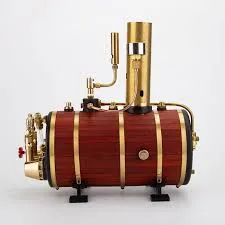
Sep . 01, 2024 06:43 Back to list
hot water boiler tank
Understanding Hot Water Boiler Tanks A Comprehensive Overview
Hot water boiler tanks are essential components in many residential and commercial heating systems. These systems provide comfort and convenience, ensuring that hot water is readily available for various applications such as bathing, cooking, cleaning, and space heating. Understanding how hot water boiler tanks work, their benefits, and maintenance requirements can help users make informed decisions about their heating systems.
A hot water boiler tank operates by heating water that is stored within a tank. The heated water is then distributed through pipes to various fixtures in a building. Unlike traditional water heaters that continually heat water, a boiler can produce hot water on demand or maintain a reserve of heated water, depending on the system design. There are primarily two types of hot water boiler tanks conventional storage tanks and tankless systems.
Conventional storage tanks are typically insulated vessels that hold a significant volume of hot water. These tanks can range in size from 20 to over 80 gallons, depending on the needs of the household or facility. The water in the tank is heated by a gas or electric burner, and once it reaches the desired temperature, it is distributed through the plumbing system. One of the key advantages of this type of system is that it ensures a steady supply of hot water, making it ideal for larger households or places with high hot water demand.
hot water boiler tank

On the other hand, tankless hot water systems, also known as on-demand water heaters, heat water directly as it flows through the unit. This eliminates the need for a large storage tank and offers unlimited hot water. However, the flow rate may be limited, meaning that simultaneous hot water usage may require multiple units or larger-capacity models. Tankless systems are becoming increasingly popular due to their energy efficiency, as they only operate when hot water is needed, reducing energy waste.
When it comes to efficiency and energy consumption, hot water boiler tanks can vary significantly. Factors that influence efficiency include the insulation of the tank, the energy source used (gas, electric, or solar), and the heating method employed. Modern, high-efficiency boilers can significantly reduce energy bills and contribute to a more sustainable energy footprint.
Maintaining a hot water boiler tank is crucial for ensuring longevity and efficient operation. Regular maintenance often includes flushing the tank to remove sediment buildup, inspecting and replacing anode rods to prevent corrosion, and checking pressure and temperature settings. Homeowners should also be aware of warning signs, such as unusual noises, leaks, or inconsistent water temperature, which could indicate potential problems with the system.
In conclusion, hot water boiler tanks play a vital role in providing hot water for various applications in both residential and commercial settings. By understanding the differences between traditional storage and tankless systems, as well as proper maintenance practices, users can ensure their hot water systems operate efficiently and effectively. Whether you are considering replacing an old unit or installing a new system, a well-informed approach will help you make the best choice for your hot water needs. Investing in a quality hot water boiler tank can improve your daily comfort while contributing to energy savings in the long run.
-
High-Efficiency Commercial Oil Fired Steam Boiler for Industry
NewsJul.30,2025
-
High-Efficiency Biomass Fired Thermal Oil Boiler Solutions
NewsJul.30,2025
-
High Efficiency Gas Fired Thermal Oil Boiler for Industrial Heating
NewsJul.29,2025
-
High-Efficiency Gas Fired Hot Water Boiler for Sale – Reliable & Affordable
NewsJul.29,2025
-
High Efficiency Biomass Fired Hot Water Boiler for Industrial and Commercial Use
NewsJul.29,2025
-
High-Efficiency Biomass Fired Hot Water Boiler for Industrial Use
NewsJul.28,2025
Related PRODUCTS






















